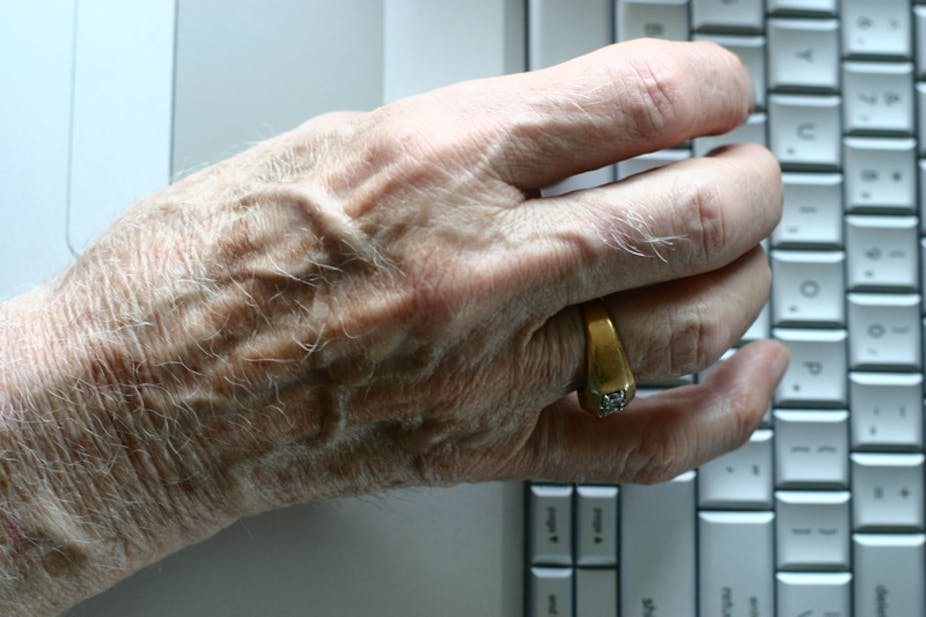Welcome to If I had a blank cheque … a series in which leading researchers reveal what they could (and would) do in their discipline if money were no object.
Today we hear from Dr Kate Cornick, Executive Director of the Institute for a Broadband Enabled Society at the University of Melbourne.
If I had a blank cheque I would take my closest friends and family on a luxury holiday and after a few relaxing weeks away I’d return to Australia, roll up my sleeves and reform aged care.
It’s no secret that Australia – like many other countries around the world – has a looming aged care crisis.
Over the next 45 years the number of Australians aged over 65 is expected to double. There is no doubt we will need more health care services to cater for our ageing population.
A blank cheque would provide the opportunity to build more hospitals and residential aged care facilities, and provide greater incentives to recognise the important work of those who deliver health care – nurses and allied health professionals in particular.
But such an investment would not address the aged care crisis that is already upon us.
A 2008 report by the State Government of Victoria (entitled “Addressing Social Isolation Amongst Older Victorians”) showed there are currently over 50,000 socially isolated Victorians over the age of 65 years. This number is expected to increase to 75,000 by 2020 - a staggering growth rate of 46%.
Any solution to the aged care crisis cannot rely on new buildings alone – it has to address the lack of facilities and social structures to support people as they age.
Recommendation 9.5 in the Caring for Older Australians report, released by the Federal Government’s Productivity Commission last week, stated as much:
“The Australian, state and territory governments should promote the expanded use of in-reach services to residential aged care facilities and the development of regionally or locally-based visiting multi-disciplinary health care teams.”
We need to rethink how to support people as they age well, by allowing them to remain independent and able to participate in society, while receiving enhanced health services.
A blank cheque could transform the aged care sector by funding the development and deployment of broadband-enabled technologies – in addition to new buildings – that would allow people to retain independence, and live in their own homes for longer.
The broadband-enabled technologies I would develop and deploy would provide a better interface to access a seamless and connected health sector – video conferencing between homes and local GPs or specialists, for example.
These technologies would not use computers and keyboards as interfaces but would instead make use of TVs, mobile phones and tablets with seamless and intuitive interfaces featuring voice and facial recognition.
By changing a TV channel, or by using a simple voice command, people would be able to “call” their friends, family, carers or doctors for a videoconference.
Such technologies will provide social connectivity, enabling people with similar interests to connect and play games such as Scrabble or Sudoku, discuss current affairs, participate in remote exercise classes, and anything in-between.
The technology will also enable easy access to life-long learning opportunities – learning a language with a Spanish teacher in Madrid, for example.
Broadband-enabled technologies would also assist older people to continue to contribute to their community, by assisting children to learn to read at school while sitting in their lounge room, for example.
The reality is that these technologies are not novel – they are very much here today.
Companies such as Microsoft, Cisco, Polycom, Ericsson, Huawei and others already have the technology that could deliver broadband-enabled aged care solutions, providing better access to health care services and generally supporting the ageing.
There are many reasons why we aren’t already seeing broadband-enabled aged care in Australia. For one, these technologies are cutting-edge with high costs and new business models have not been fully developed.
Further research is also needed to understand how such technologies might be introduced, and how issues of digital illiteracy in many facets of society – not just the elderly – can be overcome.
If broadband-enabled technologies that support ageing well are to be successful, we need to facilitate uptake and broader understandings of their capabilities by older persons, patients, carers, family members, government, the health workforce and the broader community.
The Institute for a Broadband-Enabled Society is developing some of these technologies in partnership with industry and other research partners such as the National Ageing Research Institute.
Our interdisciplinary research program is bringing together engineers, health informaticians, gerantologists, sociologists and health professionals, all to ensure Australia moves towards a better aged care system.
A blank cheque will help us get there faster, but I sincerely hope that by the time I am using the aged care system, my experience will be far superior to that which is available today.
Are you an academic or researcher? What would you do with a blank cheque? Leave your thoughts below or email us if you’d like to contribute to this series.

